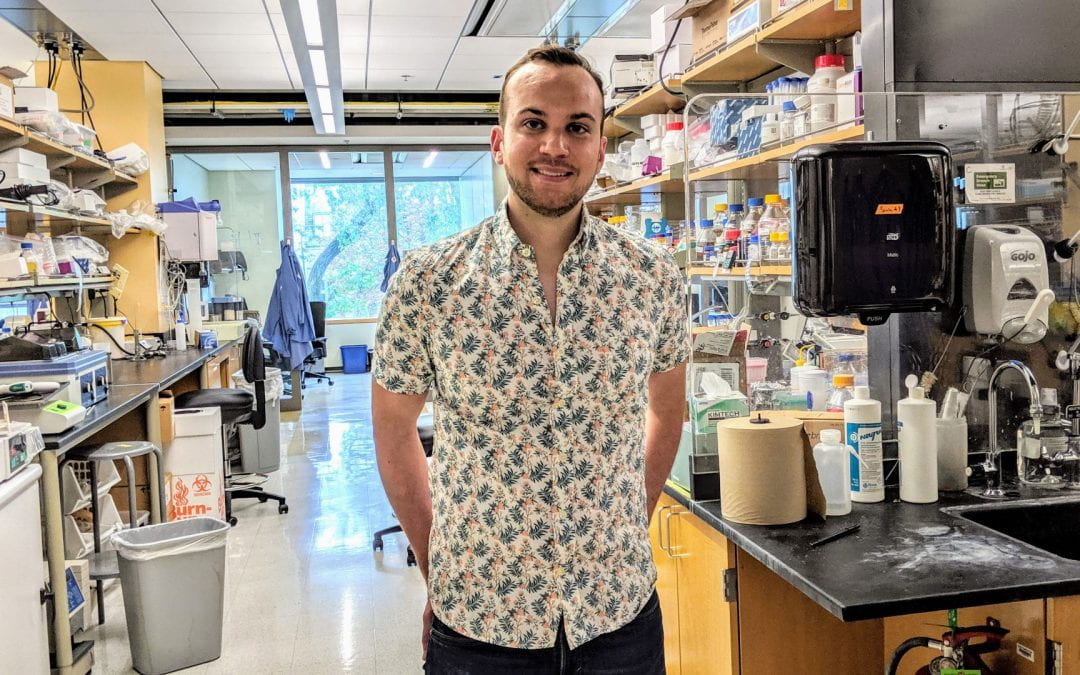Before becoming a trainee in the Chemistry of Life Processes NIH Graduate Training Program at Northwestern, Ryan McClure was already performing research at the interface of chemistry and biology. A joint student between the labs of Regan Thomson (chemistry) and Neil Kelleher (molecular biosciences, chemistry, and medicine), McClure applied for a traineeship to further his experience. He was selected to join the training program in a highly competitive application process.
“It seemed like a very natural fit,” said McClure. “It allowed me to interact with other trainees and learn about what else is happening within the university and within the field of Chemical Biology.” The training program required additional coursework in biology and participation in an extensive suite of training activities such as workshops, graduate research forums, trainee-invited seminars, and a 10-week immersion in the lab of his secondary mentor, Neil Kelleher.
McClure’s graduate work focused on analyzing microbial natural products, chemical compounds produced by microbes that can be used as therapeutics. After growing different strains of bacteria and collecting the compounds they produced, he would then test their ability to kill other bacteria, cancer cells, or fungus. Sometimes the answer was “yes,” but more often, he admits, the answer was “no.”
Towards the end of graduate school, McClure spent the bulk of his time developing “metabologenomics,” a novel approach to natural product discovery that uses big datasets to correlate the biosynthetic genes associated with natural products.
“For every single strain of bacteria that we grew, we sequenced the genome. Concurrently, we analyzed the mixture of metabolites produced by each strain with mass spectrometry. If one compound was identified in multiple strains of bacteria, we also looked for a gene (or set of genes) that only showed up in those same bacteria,” said McClure.
By correlating the two, McClure could then determine the genes responsible for making the compound. The method led to the discovery of several new compounds as well as their chemical structures. McClure was first author on an ACS Chemical Biology paper on this topic in 2016 and coauthored 7 additional publications as a graduate student.
McClure was selected to attend a 3-day career development workshop for trainees from Midwestern NIH chemistry: biology interface (CBI) T32 training programs, which was sponsored by the National Institute for General Medical Sciences (NIGMS, a directorate within the National Institutes for Health). McClure had the opportunity to present his research and learned about various industry opportunities from big pharma to biotech startups.
Following the award of his doctoral degree in 2017, he accepted a position with AbbVie where he now works as a Senior Scientist in the Proteomics and Chemical Biology groups.
“The Chemical Biology group at AbbVie was relatively new and under transition,” said McClure, “so I have been able to help launch it and figure out the directions we want to go in, the things we want to explore, and the techniques we want to use as our bread and butter.”
As part of AbbVie’s Discovery organization, McClure identifies and tests new compounds as potential therapeutics in three main therapeutic areas: oncology, neuroscience and immunology.
“At AbbVie, there’s no one person that does everything. It can take 10 years to make a single compound into a drug. Knowing how to collaborate and how to make contributions to a project are incredibly important. The CLP training program really prepared me to contribute right away—to collect and analyze data without spending months trying to figure out a whole new system and set of instruments. It also gives you the confidence to talk with scientists from all different fields.”
by Lisa La Vallee
